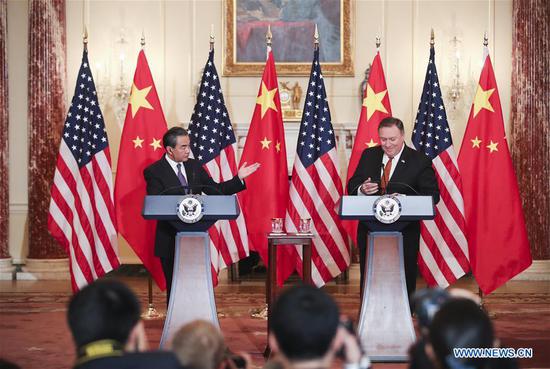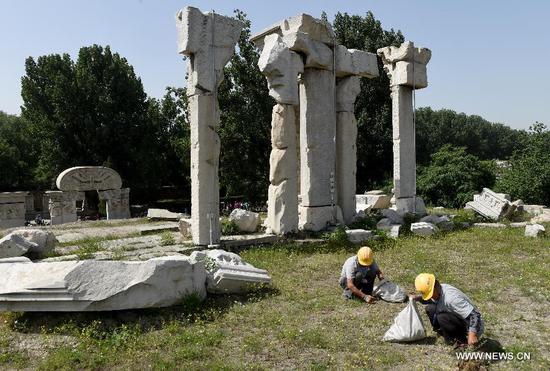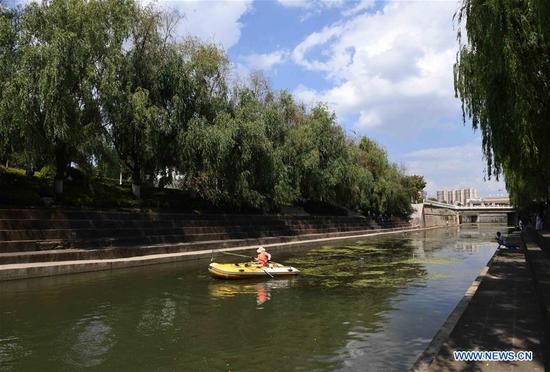
Chinese State Councilor and Foreign Minister Wang Yi (L) and U.S. Secretary of State Mike Pompeo hold a press conference after their meeting in Washington May 23, 2018. (Xinhua/Wang Ying)
Chinese State Councilor and Foreign Minister Wang Yi on Wednesday met with U.S. Secretary of State Mike Pompeo at the State Department, with both sides highlighting their commitments to promoting bilateral ties.
The two sides held in-depth discussions on bilateral and regional issues of mutual concern during Wang's stopover in Washington D.C. on his way back from Argentina.
CHINA-U.S. RELATIONS
Given an increasingly complicated international situation, it is important for China and the United States to maintain a healthy and stable bilateral relationship, Wang said.
The two sides should implement the consensus reached by the two presidents and continue to hold their various bilateral dialogues in order to move ties forward, Wang said.
Secondly, the two nations should expand win-win cooperation in various areas, Wang said.
China-U.S. economic and trade ties should benefit both nations, said Wang, adding that any agreement reached should be put into action as soon as possible, something to which Pompeo agreed.
The two sides should work to solve their trade imbalance, open their markets further to each other and protect intellectual property rights, Wang added.
Thirdly, the two nations should properly settle their differences and remove obstacles that could stifle relations, Wang said.
He expects the United States to meet China half-way, saying both countries should respect each other's interests and solve their differences in a constructive way.
Specifically, the United States should recognize the harm of Taiwan independence and abide by the one-China principle to ensure peace and stability across the Taiwan Strait, said Wang.
Last but not the least, the two sides should expand their cooperation on global issues such as the Korean Peninsula and Afghanistan.
Wang said both countries can expect to continue working together in combatting terrorism, cyber security and fighting cross-border crimes.
For his part, Pompeo said that the relationship between the world's two largest economies is of great significance. While the two sides have differences, at the same time they share great opportunities for more cooperation.
The U.S. side believes that the U.S.-China relationship should not be a zero-sum one, and is willing to work with China to continue improving bilateral ties, he added.
Pompeo said U.S. President Donald Trump highly values his sound working and personal relations with Chinese President Xi Jinping, and looks forward to maintaining close contact with him.
Regarding Taiwan, Pompeo said that the U.S. stance on the one-China policy remains unchanged.
KOREAN PENINSULA
The two sides also exchanged views concerning the Korean Peninsula.
Wang said ensuring security is the key to resolving the Peninsula's nuclear issue. He said China has always supported and created conditions for direct dialogue between the United States and the Democratic People's Republic of Korea (DPRK).
After a stalemate that has lasted years, the Korean Peninsula has been is finally moving toward a historic prospect for denuclearization, Wang said.
China encourages the United States and the DPRK to hold firm their commitments to dialogues and attend the summit as planned next month in Singapore in order to move relations forward, Wang said, adding that China is ready to work with the other parties concerned to create a favorable atmosphere for the meeting.
Pompeo said the U.S. side appreciates China's positive role in promoting the U.S.-DPRK talks and efforts to denuclearize the Peninsula.



















































